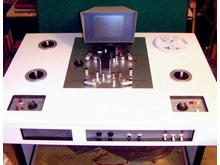This is topic Editing table in forum 8mm Forum at 8mm Forum.
To visit this topic, use this URL:
https://8mmforum.film-tech.com/cgi-bin/ubb/ultimatebb.cgi?ubb=get_topic;f=1;t=003613
Posted by Gabriel Borner (Member # 897) on April 09, 2008, 01:15 PM:
Hello!
Picked up a editing table very discretely named MKM INDUSTRIES INC model 824. It works OK.
Anyone has any documentation or experience with this piece of equipment from 1976?

Posted by Douglas Meltzer (Member # 28) on April 10, 2008, 12:11 AM:
Gabriel,
Is this a super 8mm version of the famed Moviola (or Steenbeck) Flatbed Editor?
Doug
Posted by Gabriel Borner (Member # 897) on April 10, 2008, 12:50 AM:
Hello!
No I don´t think it´s a Steenbeck or Moviola table. It´s very anonymous in design and labelling and it looks almost "generic". Very solid though. The table has been used by Swedish television some years in to the 80´s.
Regards, Gabriel
Posted by Eberhard Nuffer (Member # 410) on April 13, 2008, 01:43 PM:
This portable 4-plate (or better: four-reel-) flatbed editing table was introduced in 1974 by the American company “MKM Industries”. As far as I know, it was the only editing machine the company ever produced. The special thing about this machine was that it used full coat Super-8 magnetic film for the sound – as opposed to professional flatbed editing tables of KEM, Schmid and Steenbeck, where 16mm perforated magnetic film was used along with Super-8 picture film. Among the materials I collected when I worked on my book about film editing machines Filmschnitt und Schneidetisch, I found the following short article from the Journal of the SMPTE:
“A super-8 horizontal editing table with one super-8 picture channel and one super-8 full-coat soundtrack channel has been announced by MKM Industries, Inc., P.O. Box 313, Skokie, IL 60076. Designated Model 824, the table has four independent winding motors and an inching knob has been provided for manual operations. The film head is equipped with an eight-sided prism and the picture is rear-projected into a daylight-view ground glass. The sound is reproduced through a built-in speaker. The film and soundtrack can be uncoupled and moved independently. Features include forward and reverse speed continuously adjustable from zero to about 62 frames/s. The machine is 26 ½ in wide, 14 in high and 21 ¾ in deep. It weighs 65 lb. The price is $1,295. Options include a pushbutton-controlled synchronous motor for accurate 24 frames/s speed priced at $195; a two-channel amplifier with head, at $95; and a remote speaker at $45” (Journal of the SMPTE Vol. 83 (1974) January, p. 76).
The table is equipped with a 12 V/150 W halogen lamp, and holds reels of 600ft (180m) as a maximum.
Posted by Gabriel Borner (Member # 897) on April 19, 2008, 08:52 AM:
Hello!
Thanks a lot for Your reply. Very informative. Nice table and works OK. Still have some questions about threading.
Regards, Gabriel
Posted by Claus Harding (Member # 702) on April 19, 2008, 11:30 PM:
"Full-coat Super-8".....my goodness. As someone who worked 16-mil. Steenbecks in college, that both brings back memories and tells me about something I never thought existed in that format.
I have seen Super-8 tables before, but I never knew there were mag-transfer machines available.
Gabriel, get yourself a grease pencil and a hole punch, and welcome to the fine art of synching up workprints! :-) (If only this were still doable..)
Nice catch on the table.
Claus.
Posted by Gabriel Borner (Member # 897) on April 20, 2008, 12:10 PM:
Hello Claus and thanks for Your reply!
...grease pencil - I´m more than little lost here. I bought the table from a swedish writer who also gave me some preforated magnetic tape for syncing audio but I´ll guess I stick to K40 sound film and silent.
BTW any suggestion for a nice splicer - chemistry or tape?
Take care, GAbriel
Posted by Claus Harding (Member # 702) on April 20, 2008, 01:02 PM:
Gabriel,
The "grease pencil and hole punch" reference has to do with marking picture and sound reels so they sync up on the table, from when one used "2-system sound", with separate mag reels and film reels.
In your case, you'll have your sound on film, of course.
For a good chemo splicer, the Hahnel Kollmatic is motorized and has worked well for me for a long time.
It uses two little wheels to grind the ends of the film. You then swing the ends into place, add a bit of glue, press down on the pressure arm, wait a minute and you should have a good splice.
You still need a small 'chopping block' to do the actual cut of the film at the right perforation, though.
For tape splices, the Ciro is one of the all-time classics. A guillotine-style cutter, it is very simple and quick to work with. You use rolls of splicing tape on this.
The design has been copied and made by other manufacturers (mostly in plastic) so you can spend more and get the original or get a copy.
You can't go wrong with either of these two types of splicers.
I have splices made by either device that were made in the 70es and that are still running through the projector just fine.
Best,
Claus.
Visit www.film-tech.com for free equipment manual downloads. Copyright 2003-2019 Film-Tech Cinema Systems LLC

UBB.classicTM
6.3.1.2
